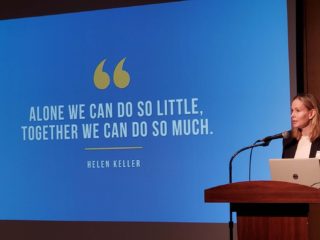Ah, the holidays… The most wonderful time of year, but also a time where tensions can run high as touchy topics pop up in conversation. Throw climate change into the mix and things can get pretty hot. Here’s how to discuss climate change without annoying your climate-skeptical friends and family.
What You’re Probably Thinking and Why You Shouldn’t Be
I Want to Piss Off Those Climate-Denying Idiots!
I know, it’s really tempting to tell that climate skeptic-denier-doubter that he’s a boob who gets his fake news from Facebook and is full of sh*t. Believe me, I’ve had to hold my tongue countless times.
It can feel good for that brief moment to piss off people who don’t know what they’re talking about (“they deserve it!”), but given the current climate crisis, that’s one potential climate ally lost and we can’t afford it. If you can convince just one person to think differently without alienating him, then that’s one more person whose eyes have been opened to reality. Think of the potential thousands of people who could be swayed from our ability to hold back what we’re really thinking.
Why Bother?
Some of you might be thinking, what’s the point of even going there? Why make the effort when your neanderthal cousin refuses to accept basic climate facts?
Or perhaps you think it’s not appropriate for polite conversation. “Don’t talk about politics, religion, and money,” as the saying goes, and in the last few decades, climate change has been added to this category of charged topics — a delicate, sensitive issue to be tucked out of sight.
Putting aside my thoughts on the foolishness of “taboo” conversation topics for another day, that climate change has been added to this general “off-limits” category is a testament to how brilliantly and masterfully special interests (think Big Oil and a certain party that supports Big Oil) have politicized and cast doubt on the facts of climate change.
Think back to just a few decades ago when Republican leaders joined with Democrats in understanding the need for climate action. Indeed, it was a Republican president, Nixon, who created the EPA and some of this nation’s most enduring environmental regulations. The science of climate wasn’t up for debate back then and we all talked freely about environmental issues. Today, as we know, it’s a different story.
Why You Should Have The Talk
Here’s the thing: Whether you like it or not, climate change isn’t a separate issue that’s flung into the holiday conversation — defiantly or tentatively, depending on who’s doing the flinging. It isn’t something to be avoided. It’s embedded in every aspect of our lives — as integral to the state of human (and planetary) existence as breathing.
Bring up pretty much any conversation topic and climate change is there, either front and center, or as a quiet influencer: politics, fashion, food and diet, education, literature, the weather (!), travel, gardening, shopping. You can’t, and shouldn’t, avoid talking about it. Instead, the goal should be to normalize a topic that’s very much a part of our world.
So how do you do it?
Get the Lay of the Land

There are two broad categories of people you’ll encounter when having a climate change conversation. There are more nuanced categories to these groups, but these broad ones will help you understand who you’re dealing with this holiday in order to determine an appropriate response.
The Climate Denier. These are the classic deniers and skeptics. At one extreme, they think it’s a hoax; at the other, more hopeful, end, they’re skeptical and misinformed.
The Climate Believer in Theory. This is the person who says she believes in climate change, but drives an enormous SUV, cuts down most of the trees in her yard to make way for the pristine, chemically-produced grass lawn, and forever forgets her reusable bags, so is forced to settle for plastic. (“I know it’s terrible, but it’s so hard to remember!”) This person gets choked up over photos of plastic straws embedded in turtles’ noses but continues to use (reluctantly!) plastic straws.
How to Discuss Climate Change and Not Piss Off People
So now that you have a sense of the type of person you could be talking with, take a deep breath, grab a glass of (organic) wine if you must, and settle down for a few minutes to read how you can discuss climate change in a way that will work for you and your holiday company.
For More Receptive Listeners: The Storytelling Approach
The Climate Believers In Theory group can be the most aggravating. There’s definitely room for progress, but it’s conversations with the In-Theory people where we mess up. We’re itching to take them down with holier-than-thou speeches, felling them with reams of facts and figures (from NOAA! from IPCC!) about the impending apocalypse because of their plastic straws. What does this achieve? Mostly resistance or complete dismissal. Trust me, the judgy-scare-tactic approach/combo doesn’t work. If you’re trying to open people’s minds, the finger-pointing approach only closes them and you’ll lose this vitally important group.
Since climate change weaves its way through most conversation topics, it doesn’t have to be brought out as a separate issue, but can emerge organically (no pun intended) in conversation — a talk about gardening, for example, could lead to the benefits of natural landscaping and composting, or a chat about clothing could segue into how second-hand fashion’s surge in popularity is a climate-friendly development.
For The Resistant: Listen and Find Openings
For a family member or friend who’s still stuck in the dark ages, you’ll need to make a more tactical approach. With the more extreme in this camp, it’s probably not worth too much effort, but if you can find common ground on an issue, it helps open the door to further discussion in the future.
In our town, that door has been a series of devastating floods that have hit the community, destroying homes and businesses. It has been heartbreaking to witness this destruction, but what has emerged from these climate-induced events is an acceptance and willingness to talk about the fact that these extreme weather events are here to stay and we need to mitigate them through various water management measures. Indeed, water management and flood mitigation were the top issues of both the Republican and Democratic platforms in our recent election.
All this is to say that it’s entirely possible to find a climate-themed issue that’s viewed as a normal conversation topic. If you start from a position of empathy – listening first and then waiting to find appropriate openings to insert climate-related issues, you’ll have a greater chance of finding success with a receptive audience.
For Everyone: Avoid Doomsday Scenarios
No one, wants to hear stories of the impending planetary apocalypse, particularly during the holidays. Your doomsday facts may be spot on, but all that horrific information will be too overwhelming to process and digest.
Is all this subterfuge? Hiding climate change in sheep’s clothing? Perhaps, but it’s a far more effective strategy than hitting people over the head with your climate pronouncements, and you’ll likely be able to impart some words of wisdom to the more receptive members at your holiday gathering.
What to Tell People Who Say, I Get it, But There’s Nothing We Can Do
Most people are well-meaning, they just don’t realize that they can be part of the solution. Here are some posts on ways to respond to someone who says she wants to help but doesn’t know where to start. I’ve also included a post on simple ways to make planet-friendly lifestyle changes:
Taking Action … What’s the Point if You Can’t Save the World?
7 Ways to Inspire Others to Take Action With You
15 Simple Ways to Ditch Plastic Straws and Other Single-Use Plastic
Resources
Have Your Facts Handy
It’s terrific that you’re willing to delve into climate issues, but if you don’t know what you’re talking about, you’ll lose all credibility. Here are some resources to help you stay up on your climate facts.
Books about climate change. Green That Life’s Best Environmental Book suggestions are a good starting point, along with the post on the most recent climate change books. Perhaps one of these books could be a holiday gift?
Staying on topic. Here are a few topic-specific articles on some of the major contributors to climate change, the tactics employed by the main players in these industries, along with a few explainers:
- Meat and dairy industry and here
- Food waste and climate change and how to make climate-friendly food choices
- The fashion industry and climate change
- (Single-use) plastic waste and climate change
- Surprising greenwashing examples
- In case you need a refresher: 7 Sustainable Habits That Aren’t Sustainable
How to Spot the Climate Myths and Debunk Them
Know your climate myths and know how to spot and debunk them with Green That Life’s post on Opening Our Eyes to Climate Change Myths.









